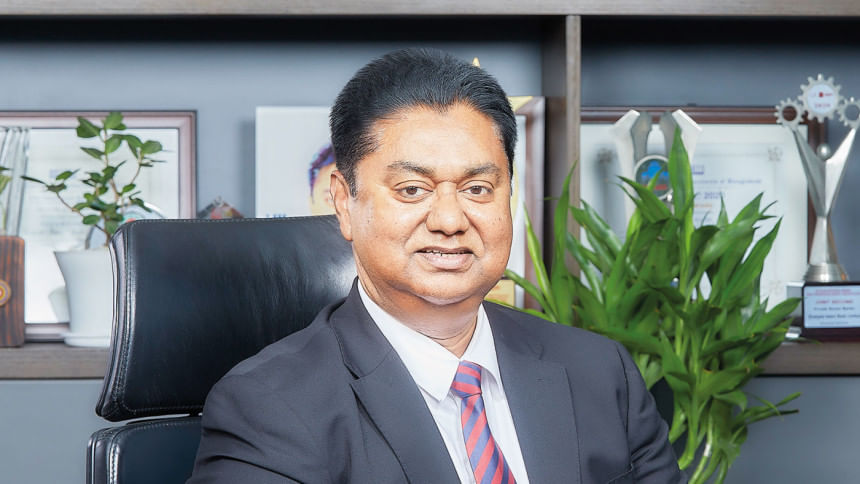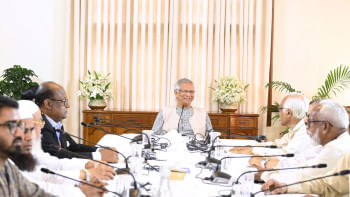Expanding financing for green assets and projects

Mosleh Uddin Ahmed
Managing Director, Shahjalal Islami Bank
The Daily Star (TDS): How would you assess the current state of sustainable banking in Bangladesh?
Mosleh Uddin Ahmed (MUA): Bangladesh now has a well-structured foundation for green banking, underpinned by strong commitment from the central bank. The sector has grown steadily since Bangladesh Bank (BB) issued comprehensive guidelines in 2011 and introduced refinance schemes for green products. All banks are required to maintain green banking policies and submit quarterly reports, though implementation and disclosure standards vary, with some focusing more on revenue-linked initiatives than on core environmental concerns such as waste management.
In December 2020, BB introduced the Sustainable Finance Policy. By 2024, sustainable finance accounted for 39.66% of total banking sector investment, against the annual target of 20%, while green finance represented 13.29% of total term investment, well above the 5% target. Our Bank alone disbursed almost 90% of total investment as sustainable finance and 39.25% of term investment as green finance. Refinance facilities, including the Green Transformation Fund (GTF) and Technology Development Fund (TDF), further support environmentally friendly products such as solar energy, biogas plants, and effluent treatment plants. While progress is strong, full compliance with BB guidelines aligned to the UN SDGs requires more consistent implementation across all banks.
TDS: What sustainable financing/refinancing schemes does your bank offer, particularly for SMEs, women entrepreneurs, or other environmentally responsible enterprises?
MUA: We serve our SME and agriculture clients through Bangladesh Bank refinance facilities in many underserved markets. SJIBPLC prioritises financing for women entrepreneurs. The Bank offers the Prottasha investment scheme, specifically designed to provide financial assistance to women entrepreneurs in both urban and rural areas. While banks usually charge 13–14% profit for other borrowers, we provide investment facilities to women entrepreneurs at 5–6% profit rates, from both our own sources and Bangladesh Bank's refinance. We also provide collateral-free investment up to Tk. 25 lakh. Since NGOs have direct access to farmers, Shahjalal Islami Bank PLC disburses agricultural investment in crops, fisheries, and livestock mainly through NGO linkages.
The Bank is dedicated to empowering women entrepreneurs through promoting the Cottage, Micro, Small, and Medium Enterprises (CMSME) sector across the country. Understanding the importance of financial literacy among women, SJIBPLC frequently organises seminars and workshops on financial literacy for "Development of CMSME Women Entrepreneurs."
TDS: What initiatives has your bank undertaken to promote sustainable banking, and what measures have you implemented to reduce your own carbon footprint?
MUA: Shahjalal Islami Bank PLC (SJIBPLC) has been recognised by Bangladesh Bank as a Top Sustainable Bank in its prestigious Sustainability Rating 2024. Our Bank is uniquely positioned to act as a catalyst in Bangladesh's transition towards a greener and decarbonised economy. As a sustainable bank, we have embedded environmental considerations into our operations and financing decisions through strategic green investments and responsible banking to address environmental challenges.
By integrating Environmental, Social, and Governance (ESG) factors into our investment decisions, we proactively identify and manage risks that could impact the value of our portfolio, targeting net zero emissions gradually. We conduct Environmental and Social Due Diligence (ESDD) for every eligible investment client.
Keeping short-, medium- and long-term goals in consideration, SJIBPLC places high importance on environmental issues and decreasing carbon emissions, following SDGs and national strategies. For the first time, our Bank has measured its carbon emissions, which included both direct and indirect (Scope 1, 2 and 3) criteria. In terms of electricity, fuel, water, paper, and toner consumption, we are committed to reducing carbon emissions and conserving natural resources in the days ahead, working towards a decarbonised world.
We are working to popularise our digital products, such as QR code-based transactions, green PINs for paperless credit and debit card activation, a PIN generation system, the Central Circular Management System (CCMS), and Shahjalal TouchPay.
TDS: What challenges has your bank encountered in adopting and promoting sustainable banking practices?
MUA: In adopting and promoting sustainable banking practices, three major challenges include lack of awareness, compliance, and implementation of reporting standards. There is a continuing need for greater awareness among both bankers and clients about the social and ecological impacts of financial activities. Banks and financial institutions must establish strong governance practices to adequately comply with sustainable finance reporting standards.
The lack of experts with in-depth knowledge of sustainable finance reporting, along with inadequate IT solutions to effectively assess and manage the vast amount of information required, makes it difficult for financial market players to meet PCAF and EU Taxonomy reporting requirements. Banks must therefore invest in training to build expertise in reporting requirements and ensure accurate and timely reports.
TDS: What are your bank's future plans to advance sustainable banking, and what support do you seek from the government?
MUA: SJIBPLC is committed to increasing financing in green assets and projects, including renewable energy, solid and liquid waste management, green buildings, low-carbon technologies, and energy-efficient capital machinery. We are dedicated to deploying our knowledge, capital, and capacities with impact, integrating sustainability into our investment decisions, and seeking collaborative partnerships to address global challenges. Together, we can build a sustainable future.

 For all latest news, follow The Daily Star's Google News channel.
For all latest news, follow The Daily Star's Google News channel. 



Comments